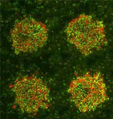|
Today
8 a.m.
Human Resources
New Employee Orientation
Bldg. 50 Auditorium
9 a.m.
EHS 348
Chemical Hygiene Safety
Bldg. 51-201
Noon
EETD
Linking Enviromental
Exposures to Health Effects
S.M. Rappaport, U. of North Carolina
Bldg. 90-3148
Employee Activities Assoc.
Dance Lesson
Joy Kono, Jeff Philliber
Bldg. 71-146J
1 p.m.
EHS 231
Compressed Gas & Cryogen Safety
Bldg.51-201
4 p.m.
Life Sciences
Alzheimer's Disease, Brain Imaging, and the Search for Prevention Therapies
Eric Reiman, Translational Genomics Research Institute
Bldg. 66 Auditorium
Tomorrow
12:15 p.m.
Employee Activities Assoc.
Yoga Class with Chris Hoskins($10/$12)
Bldg. 70A-3377
1:30 p.m.
Physics
B Meson Decays to Vector Particles: A new Window on Fundamental Interactions
Andrei Gritsan
Bldg. 50B-4205
|
|
|
 |
| |
| Morning
Editions: Ham & Smoked Cheddar Scramble with Potatoes & Bagel
Tomorrow's Breakfast: Banana Pancakes with Two Eggs and Sausage
Menutainment: Fiesta Taco Salad with Ground Turkey
The Fresh Grille: Grilled Club Sandwich with Side Green Salad
Market Carvery: Cheese Enchiladas with Rice & Beans
Special Deal: Pepsi, Diet Pepsi,
Moutain Dew, Sierra Mist 12 packs for $2.99
|
B'fast: |
6:30
a.m. - 9:30 a.m. |
| Lunch: |
11
a.m. - 1:30 p.m. |
Full
menu
 |
|
|
|
 |
|
 |

New Insights in Role
Of Genetics in Fitness
By
Glennda Chui
|
|
|
|
 |
 |
|
|
Williams |
|
|
|
Some people stay fit and live to a ripe old age, despite never bothering to exercise. Why? A recent report may provide an answer. Researchers ran rats on a treadmill, then bred the best runners, and did the same with the worst runners, until they had superjocks and superwimps. The average rodent jock could run 42 minutes without stopping; the average wimp, just 14 minutes. The least fit rats gained more weight as they aged and increased the chances of heart disease and diabetes. Paul Williams, a health researcher at Berkeley Lab who has been studying similar issues in humans, said the new study offers insights into the role of genetics in fitness. Full story.

MetaChip Will Allow
Rapid Drug Screening
|
|
|
|
 |
 |
|
|
Clark |
|
|
|
 |
|
|
|
Breast cancer cells on a MetaChip |
|
|
|
Researchers
at UC Berkeley and Rensselaer Polytechnic Institute
have created a biotech chip that mimics the metabolic
reactions in the human liver, allowing rapid screening
of potential drugs to identify those activated by the
liver and to weed out those made toxic. "The MetaChip
would allow testing a backlog of compounds for toxicity
earlier in the drug discovery process — faster
and more efficiently — and help remove a current
bottleneck in the drug discovery process," said
Douglas Clark, UC Berkeley chemical
engineering professor and Environmental Energy Technologies
scientist at Berkeley Lab. Full
story.
|
 |
|

|
| |
 |
|
|

